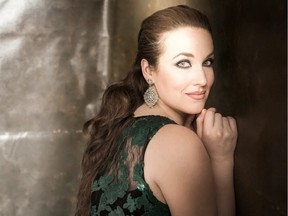It’s just like old times: Vancouver Opera offers five—count ’em—five performances of George Bizet’s 1875 blockbuster Carmen.

Reviews and recommendations are unbiased and products are independently selected. Postmedia may earn an affiliate commission from purchases made through links on this page.
Article content
Vancouver Opera presents Bizet’s Carmen
When: April 27 to May 5
Article content
Where: Queen Elizabeth Theatre, 630 Hamilton St., Vancouver
Tickets and information: https://www.vancouveropera.ca/whats-on/carmen/
It’s just like old times: Vancouver Opera is offering five, count ’em, five performances of George Bizet’s 1875 blockbuster Carmen, a powerful indication that they believe it will appeal to opera neophytes and connoisseurs alike.
Advertisement 2
Article content
Why should VO think this is what Vancouver audiences need? Well, there is no opera fan who doesn’t like the piece. But a compelling agreement can be reached that Carmen is a spectacular gateway drug for newcomers who want to see what opera is all about.
Here are five brief reasons why Carmen makes such a wonderful “first opera”:
The history
Based on a gripping story of seduction and death written in 1845 by Prosper Mérimée, Carmen is packed with action. Furthermore, it shows characters that have never before been celebrated in opera: neither kings nor queens, nor gods nor goddesses.
The serialized novel was considered a real surprise in its time, and with the right production, the musical adaptation can still have a powerful impact.
The roles
We have Michaela, the good girl, Don José, the handsome military officer (perhaps the most difficult role to make work dramatically), and Escamillo, a bullfighter, all arrogance and bravado.
As for Carmen, well, she’s the bad girl archetype we all adore. Capricious and contradictory, Carmen is definitely her own woman, and we are all helpless before her from the moment she appears on stage.
Article content
Advertisement 3
Article content
vocal writing
Bizet breaks the stereotypes of opera. Sopranos often have dramatic and vocal presentations. Soprano Michalea gets a couple of really great numbers, perfect vehicles for a certain kind of operatic naiveté, but she’s definitely a second banana.
Next in the conventional pecking order are the tenors, and Don José, Carmen’s suitor, is one of them. But tenors are usually heroes and/or romantic protagonists; Don José is a conflicted mess.
Toreador Escamillo is a bass baritone, a type of voice often used for former companions, old men, and villains. Escamillo struts and struts like a tenor, but he is too much of a spectator to be blamed for the violence that unfolds.
Carmen
Carmen is a mezzo-soprano, for God’s sake, a type of voice usually limited to mothers, best friends, and maids.
But not here: Carmen is the star, and the lower, smokier range of a mezzo-soprano is a great choice for a woman who is no longer in her prime, who has been around but knows exactly who she is.
VO has twice cast the role, with Sara Mesko singing three performances and Ginger Costa-Jackson singing two.
Potential to reinvent
Advertisement 4
Article content
Carmen is set in a 19th century Spain full of factory workers, gypsies, smugglers, military personnel, etc.
But in this piece those guys can transform according to any good directional concept. This doesn’t always work: the Metropolitan Opera’s latest Carmen, set in a vaguely defined American West, apparently sucks.
But what Canadian director Joel Ivany did with the piece in VO’s 2014 production was magical, somewhat traditional, but sort of not.
You’ll have to go see what director Rachel Peake thinks.
Music
Bizet worked hard and died young, thinking that lasting fame had eluded him. It’s just one of those terribly sad historical events.
But in Carmen he gave us unforgettable melodies, almost all of them placed in equally unforgettable contexts. Even if you’ve never been to an opera house (or Vancouver’s facsimile, the Queen Elizabeth Theatre), tunes everyone knows appear in every act with gratifying frequency.
All very well, but even better is the way Bizet progresses the evening, from a tense overture to a violent, inexorable conclusion. This is beautiful married music and drama.
Advertisement 5
Article content
A small note of warning: The Parisian public expected to get their money’s worth. Carmen spans four substantial acts, although today we have a single intermission between the second and third acts. And the spoken dialogue, as Bizet intended in his original version, helps keep the plot moving forward.
But neophytes, beware. Opera is seriously addictive. Carmen especially.
Recommended by Editorial
-

Review: VSO audience delighted with performances by Gemma New and Augustin Hadelich
-

Classical music: Vancouver composer and Lions Gate Sinfonia present visionary new Requiem
Bookmark our website and support our journalism: Don’t miss the news you need to know – add VancouverSun.com and LaProvincia.com to your favorites and subscribe to our newsletters here.
You can also support our journalism by becoming a digital subscriber: for just $14 a month, you can get unlimited access to The Vancouver Sun, The Province, National Post and 13 other Canadian news sites. Support us by subscribing today: The Vancouver Sun | The province.
Article content


